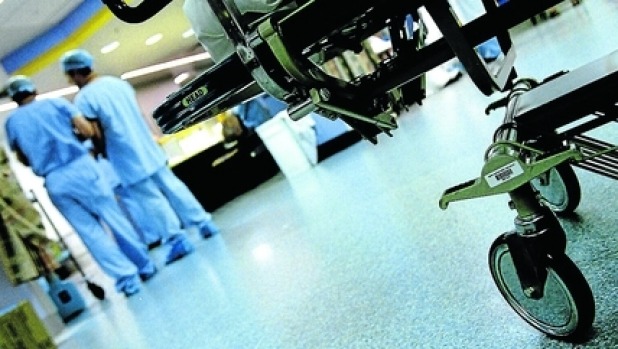
The report has been described by opposition leader Mark McGowan as one of the most shocking he has ‘ever seen in my entire life’. Photo: Gabrielle Charlotte
The WA Health Minister says he is yet to see the “leaked” department-ordered report which says cancer services in the state are collapsing and putting lives at risk.
The 2015 WA Adult Cancer Care Taskforce report, described by opposition leader Mark McGowan as “one of the most shocking reports I have ever seen in my entire life”, says the major realignment of services from Fremantle and Royal Perth hospitals with the opening of Fiona Stanley has resulted in “fragmentation of care, delays in treatment and compromised patient safety.”

Charles Samuels launched a petition about the under staffing at the Cancer Centre following his wife’s treatment. (inset) Doris Samuels awaiting chemo treatment.
On Tuesday afternoon, Dr Kim Hames said that although he asked for the report, he admitted he had not yet seen it.
The taskforce of authors was set up by department acting director general Bryant Stokes in April and included surgeons and senior staff from institutions including Fiona Stanley, Sir Charles Gairdner and Royal Perth, including the heads of general surgery, radiology and oncology departments at those hospitals.

Linda Felsinger says chemotherapy patients waited for five hours with no treatment.
They reported that the closure of oncology services at RPH, particularly, had caused “poor access to patient records”, “numerous clinical incidents” and the resignations of senior doctors because of unsustainable workloads.
“There are anecdotal reports of a sharp increase in presentations to cancer counselling services in recent months, as patients fear their cancer outcome has been adversely affected,” the report says.
It also says that there has been a “very worrying” blowout in waiting times for diagnoses and treatments over the past six months, including waits of up to six months for breast lesion removals when the standard was six weeks; up to four-month waits for people whose bowel screenings had tested positive; and wait times for a prostate clinic rising from three weeks to three months. Many “optimal” wait times are not being met, endangering patients, it says.
The report says the abolition of specialist cancer nurses in the move to Fiona Stanley has “resulted in a dysfunctional approach to cancer care that has led to poor coordination of care, significant and unsafe delays in treatment and inefficient use of scarce specialist doctors’ time”.
Colorectal and lung cancer clinics at FHS, particularly, are experiencing “extreme stress” because of this lack of senior nurses – “patients being appointed to the wrong clinic, patients being totally lost from the system”, and “inability to effectively triage”.
It says governance issues at FSH have seen many trials, for example, one in cervical cancer, suspended.
The report says estimates of volume and complexity of cancer care services have fallen short of demand and recalculation of future demand is urgently needed.
“Urgent recommendations” include that the government re-establish a level 5 oncology service at Royal Perth Hospital, “urgently reinstate the specialist cancer nurses at Fiona Stanley Hospital, Royal Perth Hospital and in regional areas”, remove a staffing cap and conduct a “detailed and transparent audit” of cancer diagnostic and treatment wait times.
Upon releasing the report to the public, opposition health spokesman Roger Cook said a “concerned member of the public” had given the opposition the report, worried about the wait times patients were experiencing.
“This report was called for by Bryan Stokes in April and delivered to the [Director General] in June,” he said.
“It’s now been nine weeks that report has been sitting on the DG’s desk … [it] speaks volumes for the level of frustration that is now being felt.
“It’s been confirmed to me by senior cancer stakeholders that the government has not responded to this report either publicly or internally.”
While he acknowledged the department had only just had a new director general appointed, he said cancer was “one of the great emerging challenges for our healthcare system” and said it was “unacceptable” for the government to sit on its hands any longer.
“This report doesn’t hold back. It says patient safety had been compromised … it is a heartfelt plea from senior clinicians and cancer stakeholders across WA,” he said.
“There can only be one result … if patients are forced to wait for cancer services.”
Cancer Council WA, whose chief executive is one of the report’s authors, declined to comment further.
Dr Hames insists the report is only a draft version.
“…it’s looking at whether or not we need to keep some services at Royal Perth which is why I requested the review in the first place.
“We sent it out to all of the senior commissions involved in providing their services to see if they were happy with the contents of the report; that will then come to me when it’s finalised.
“I haven’t seen it yet.”
WAtoday has run several reports in recent months featuring patient and families’ accounts of problems in the cancer care system in WA.
One patient’s husband spoke of “painful” and “horrendous” experiences at Sir Charles Gairdner Hospital’s state-of-the-art Cancer Centre, describing it as well equipped but “hopelessly understaffed”.
Another breast cancer patient described a “cancer section in chaos” and nurses in tears at SCGH, while another got in touch to say the Cancer Centre was “understaffed“.
